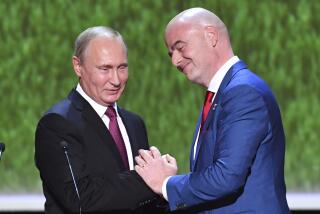Tennis, Soccer Impose Bans on Yugoslavia : International sports: Moves are in response to U.N. Security Council’s call for sanctions.
- Share via
In response to the United Nations Security Council’s call Saturday for sanctions against Serbian-led Yugoslavia because of its aggression against the former republic of Bosnia-Herzegovina, tennis and soccer federations imposed bans Sunday against the country.
Officials from the International Tennis Federation announced that Yugoslavia will not be allowed to compete in team competitions, including the Davis and Federation cups, while the U.N. sanctions are in place.
They said, however, that the ban will not apply to individuals, such as Monica Seles, who is defending the French Open championship she has won the last two years.
Officials from UEFA, the European governing body for soccer, announced that Denmark will replace Yugoslavia in the eight-team European Championships, which will begin on June 10 in Sweden.
Yugoslavia’s participation was in doubt even before the U.N. action. Many players who were part of the team when it qualified were from the former republics of Croatia, Slovenia, Bosnia and Macedonia and had quit in protest of the hostilities.
Ivica Osim, the national team’s Croatian soccer coach, resigned last week, reportedly because he and his family have received death threats from both Serbians and Croatians.
Also Sunday, FIFA, the international governing body for soccer, announced that Yugoslavia cannot participate this year in qualifications for the 1994 World Cup if U.N. sanctions are not lifted.
Officials from the International Olympic Committee will meet this week to discuss whether to withdraw their invitation to Yugoslavia for the 1992 Summer Olympics. Josep Miguel Abad, chief executive officer of the Barcelona organizing committee, expressed pessimism.
It was a dramatic shift in his mood from Friday, when the International Amateur Athletic Federation, which governs track and field, became the last of the Olympic movement’s major sports federations to re-admit South Africa for the Barcelona Games.
The IAAF’s president, Primo Nebiolo, said Sunday that the federation probably will abide by the U.N. sanctions against Yugoslavia.
“The U.N. decision is not good news for the Olympic movement,” Abad said. “The Barcelona dream of having the whole world represented at the Games won’t be realized unless we use imagination.”
Suggesting that Yugoslav athletes compete in Barcelona under the Olympic flag, he said, “The athletes aren’t to blame for anything that’s happening in Yugoslavia.”
Yugoslavia has had its most success internationally in team sports, such as basketball, water polo and team handball. They, like soccer, have been affected by the civil war.
The defending world champion and 1988 Olympic silver-medalist, Yugoslavia’s basketball team lost several of its best players to Croatia when it gained independence. Despite the presence of Laker center Vlade Divac, a Serbian, Yugoslavia was expected to have difficulty qualifying for the Olympics when the best European teams meet in a tournament later this month in Spain.
George Killian of Colorado Springs, Colo., president of FIBA, the international basketball federation, said Sunday that he will be in contact today with the federation’s secretary-general, Yugoslavian Boris Stankovic.
Ross Wales of Cincinnati, secretary-general of FINA, the international federation for water sports, said that the federation probably won’t react soon. Yugoslavia won the Olympic gold medal in water polo in 1984 and 1988.
“I’m surprised that some federations have moved so fast,” he said. “Thinking back to the boycotts of ’80 and ‘84, the virtually unanimous reaction was that athletes shouldn’t be used in this manner. That doesn’t mean I condone the situation in Yugoslavia, but I’m not sure that banning athletes from international competition is going to accomplish anything.”
Times staff writer Elliott Almond in Paris and wire services contributed to this story.
More to Read
Go beyond the scoreboard
Get the latest on L.A.'s teams in the daily Sports Report newsletter.
You may occasionally receive promotional content from the Los Angeles Times.






